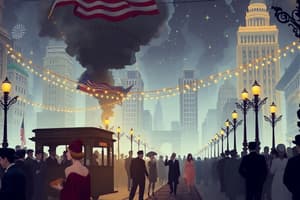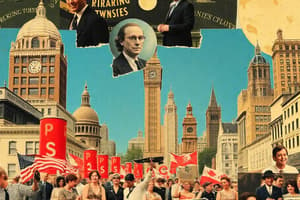Podcast
Questions and Answers
What was a key belief of Coolidge regarding American prosperity?
What was a key belief of Coolidge regarding American prosperity?
- It depended on the success of American business. (correct)
- It relied on agricultural development.
- It depended on international trade agreements.
- It was tied to the strength of the military.
What was a consequence of the Quota System established in the 1920s?
What was a consequence of the Quota System established in the 1920s?
- Open borders for all countries.
- Immediate citizenship for all immigrants.
- Increased immigration from Southern Europe.
- Limits were imposed on the number of immigrants. (correct)
Which movement focused on African American cultural revival in the 1920s?
Which movement focused on African American cultural revival in the 1920s?
- The New Deal.
- The Great Migration.
- The Harlem Renaissance. (correct)
- The Civil Rights Movement.
What led to the first Red Scare in the United States?
What led to the first Red Scare in the United States?
What economic trend characterized the Roaring 20s?
What economic trend characterized the Roaring 20s?
What was a significant cultural revival during the 1920s focused on African American expression?
What was a significant cultural revival during the 1920s focused on African American expression?
What major social change did Prohibition contribute to in the United States?
What major social change did Prohibition contribute to in the United States?
Which practice allowed consumers to purchase goods and pay for them in installments during the 1920s?
Which practice allowed consumers to purchase goods and pay for them in installments during the 1920s?
How did consumer behavior change during the Roaring 20s?
How did consumer behavior change during the Roaring 20s?
Which cultural form was NOT a primary focus of the Harlem Renaissance?
Which cultural form was NOT a primary focus of the Harlem Renaissance?
Study Notes
Post-WWI America: A Return to Normalcy
-
Warren G. Harding's slogan "A Return to Normalcy" reflected a desire to revert to pre-war life.
-
Calvin Coolidge, Harding's successor, believed that American prosperity relied heavily on the success of businesses.
The Roaring Twenties: Changing Landscapes
- Women's suffrage became a reality in 1920, granting women the right to vote after decades of activism.
- The growing auto industry fueled a boom in businesses like gas stations, tourist cabins, and restaurants.
- Installment buying allowed consumers to purchase goods and make payments gradually, contributing to the growth of consumer spending.
- The assembly line played a major role in producing consumer goods in greater quantities, boosting the American economy.
Social and Political Tensions
- The Five Power Treaty sparked anger in Japan, as it resulted in a smaller naval fleet compared to Great Britain and the US.
- The Quota System was implemented to limit immigration, reflecting a growing fear of foreign influence.
- The First Red Scare was fueled by widespread fear of Communism, culminating in Attorney General Palmer's belief that communist infiltration threatened the nation's foundation.
- The Sacco and Vanzetti trial and the resurgence of the Ku Klux Klan highlighted the pervasive fear of and discrimination against immigrants in the US.
Cultural Revolution and its Impacts
- The Harlem Renaissance, a cultural movement centered in Harlem, New York City, saw a significant revitalization of African American art forms like music, theater, and poetry.
- Movies, cars, and radio played a key role in transforming American culture and lifestyle during the 1920s.
- Prohibition, the ban on alcoholic beverages, inadvertently contributed to the rise of organized crime.
Isolating from the World
- Isolationism became the defining tenet of US foreign policy following WWI, reflecting a desire to avoid international entanglements.
The Harlem Renaissance
- A period of significant cultural growth for African Americans in the 1920s.
- It saw a flourishing of artistic expression in music, theater, and poetry.
Prohibition
- A period in the United States from 1920 to 1933 when the manufacture, sale, and transportation of alcoholic beverages was illegal.
- It contributed to the rise of organized crime as criminal gangs took over the production and distribution of alcohol.
The Roaring Twenties
- An era of economic prosperity in the United States characterized by rapid growth in consumer spending.
- The availability of installment buying allowed individuals to purchase goods and pay for them over time, fueling this economic boom.
Studying That Suits You
Use AI to generate personalized quizzes and flashcards to suit your learning preferences.
Description
Explore the transformative years in America following World War I, marked by a desire for 'normalcy' and rapid economic growth. This quiz covers key events such as women's suffrage, the rise of consumerism, and international tensions that shaped society during the 1920s.




